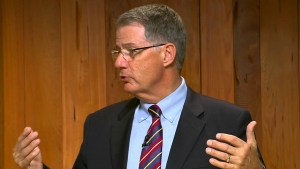When the minister consecrates (i.e., sets apart for sacred use) the elements of the Lord’s Supper (i.e., bread and wine), what happens? Does the substance of the elements change? Does the bread become something other than it was? Does it become the . . . Continue reading →
Heidelminicast: Hill On The Eschatology of Jude’s Grandsons
Charles Hill explains the significance of the testimony of Jude’s grandsons for our eschatology. Continue reading →









